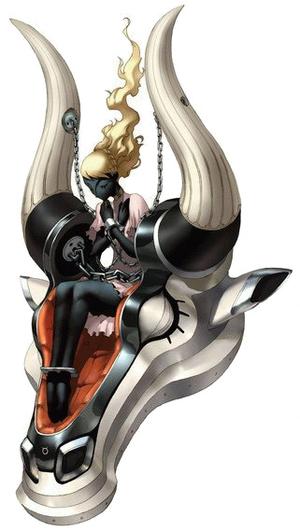Part 247: Io
Freaksaus posted:
Thanks for this, pretty damn interesting stuff. This made me realise they kept the same theme going in Persona 4 with Izanagi and Izanami: lovers that are seperated by death and the living one going into the underworld to bring them back.
I believe the Izanagi mythology post in the P4 thread, which was written by someone else, explicitly called that connection out. Choosing Orpheus as the starting Persona was, like Izanagi, a thematically significant decisions, albeit for very different (and extremely spoiler-y) reasons.
As long as we're on the topic...
 PERSONA MYTHOLOGY UPDATE
PERSONA MYTHOLOGY UPDATE
Let's talk about Io.

Io is one of the many, many women in Greek mythology who are unfortunate enough to attract Zeus's attention and subsequently arouse his wife Hera's anger. She was the daughter of the river god Inachus and served as one of Hera's priestesses on the island of Argos, the center of the worship of the goddess in Greek civilization.
When Zeus came to sleep with Io, he surrounded her with thick clouds in order to hide her from Hera. This backfired, as it only aroused Hera's suspicion, prompting the goddess to go looking for her husband. Zeus then transformed Io into a beautiful white heifer just before his wife arrived on the scene. This scheme backfired as well. Hera, who was not fooled for a second, demanded that he give the cow to her as a present, and Zeus could not refuse without revealing himself. Hera tied Io to an olive tree in one of her temples and set Argus Panoptes to watch over her. Argus had one hundred eyes; when he needed sleep, he would close half of his eyes and keep watch with the other fifty.
Feeling pity for the poor girl, Zeus sent his son Hermes to rescue Io. Hermes disguised himself as a shepherd and lulled all of Argus's eyes to sleep by playing music on his pipes and telling stories. As soon as Argus fell asleep, Hermes slew him and released Io from captivity. Hera later rewarded Argus for his service by putting his eyes in the plumage of her sacred bird, the peacock.
Despite gaining her freedom, Io's suffering continued. Hera sent a gadfly to sting the heifer in order to drive her insane with pain, which then chased Io all across Europe. Io fled from the fly down the west coast of Asia Minor, giving it the name Ionia. Then she forded the straits between the Propontis and the Black Sea, giving it the name "Bosporus" (ox-crossing). Shortly thereafter she encountered Prometheus, the titan who had brought fire to humanity and was chained to a rock and attacked by vultures on a daily basis as punishment for that act. Prometheus told Io that she would continue to suffer great misfortune, but ultimately would settle down in Egypt and have a peaceful life. He also predicted that one of her descendants would become a mighty hero and free him.
Sure enough, Io eventually came to Egypt, where Zeus returned her to human form. She bore him a son, Epaphus, and became the Queen of Egypt. One of her descendants was the famous Herakles, who freed Prometheus during his twelve trials.
The story of Io is apparently very old. Homer refers to Hermes as Hermes Argeiphontes, "Hermes Argus-slayer." She is associated with the Mycenaean people, an early Greek civilization from the Bronze Age.